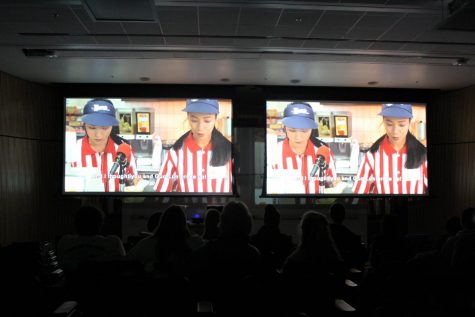‘If I were in college, I would learn Chinese’
November 20, 2019
Kung fu, dim sum, a “Made in China” label are some things that might go through your mind when you think of China. Many people in the world consume Chinese goods, but learning the language can come across as difficult to some.
Starting from Nov. 5, the CWU world languages and cultures department has been hosting a Chinese film festival featuring four films to promote the Chinese language program. It is free and open to all in the community.

The final film, called “Blind Shaft” (2003), will be shown on Nov. 25 at 4 p.m. in Samuelson 104, followed by a discussion.
According to Babbel, a language-learning app website, Chinese is the most widely spoken language in the world with roughly 1.3 billion native speakers.
This means that learning Chinese is a great asset, especially to students, said Michael Johnson, the chair of the world languages and cultures department.
“If I were in college, I would learn Chinese,” Johnson said. “Because I know that the shape of global cultures is going to be at least partly, an important chunk of it, will be determined by China.”
One in three jobs in Washington state is export related and China is Washington’s largest trade partner, according to Choose Washington State website, which falls under the Washington State Department of Commerce.
“Because of the Port of Seattle and Port of Tacoma, we do an incredibly high volume of shipping trade with China,” Johnson said. “There are lots of jobs in the state that having the language gives you an edge in terms of getting the job.”
Shiyan Liu, the president of Chinese Students and Scholars Association (CSSA), attended the showing of “The Grandmaster” (2013) and “Eat Drink Man Woman” (1994).
Liu said learning about a culture different from your own can help you understand the people who grew up in that culture.
“I came to the United States when I was 14,” Liu said. “So I already grew up in Chinese culture, but I [also] spent a long time in America to learn some American cultures. So when making Chinese friends and American friends, I can [hang out] easily with them, because I know their background and their culture.”
Liu also talked about stereotypes that some foreigners might have about Chinese people.
“They’re always thinking, ‘Oh, Chinese people are smart.’ That’s the most [common] thing I hear,” Liu said. “‘Oh, you’re Asian, you’re probably really good at math.’”
She explained that the Chinese government pushed education on students, so the math level in elementary and middle schools in China differ from that of American schools.
Liu said one of CSSA’s missions is to allow people in the community to explore Chinese culture.
“Chinese is no different [from people] from other countries,” Liu said. “We try to get rid of stereotypes, racism and to let [people] know that a lot of fun things in China might interest [them].”
Liu said CSSA also exists to provide a place for Chinese students to belong.
“Our goal for this club is we try to [help] Chinese international students and scholars to feel welcome in American culture,” Liu said. “Because it is a long distance for them to come here just to study abroad. We want them to feel welcome … so they don’t feel lonely or sad.”
Johnson said that the department has been hosting events such as Tai Chi and Chinese calligraphy demonstrations, Lunar New Year and harvest lantern festival to give people access to an important global culture.
“We have been working on finding ways to promote the language and culture a little more actively on campus in the past two, three years,” Johnson said. “Partly because we’re interested in attracting more students to the Chinese program.”
While people can watch Chinese films on their own on Netflix and other streaming services, Johnson said, their event can provide a space to discuss the film together.
“What we can offer is lectures from experts on Chinese culture who can help you make sense of what it is that you’re watching, in terms of the cultural context, like how would a Chinese viewer see this film, what details would they focus on, what would they notice that a U.S. viewer might not notice,” Johnson said.
Chinese Film Specialist, Dr. Yomi Braester, who teaches Comparative Literature and Chinese at the University of Washington, was a speaker for “The Grandmaster” film discussion.
Braester talked about the film’s depiction of time, fate and love in the biography of Yip Man, also known as Bruce Lee’s martial art teacher, and how the director Wong Kar-Wai achieves his artistic vision in the film.
Chinese instructor Yuanxia Liu spoke after the showing of “Eat Drink Man Woman,” a comedy drama film about family relationships, the search for love and cooking food as a means to express love.
Yuanxia Liu discussed the traditional and non-traditional roles within the family and society, and the meaning behind the characters’ Chinese names that reflected their personality and roles.

